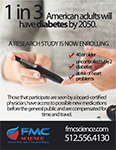Diabetes can be a confusing disease to understand. You may have heard of type 1 and type 2 diabetes, but really don’t understand the differences between both. However, identifying a few key differences among the two can be a real help in making sense of the disease.
Essentially, diabetes is a disease that occurs when blood sugar levels in the body are too high. Over 29 million people are affected in the U.S. alone. Most people have type 2 diabetes, while only 5 to 10 percent suffer from type 1.
Here are some guidelines to help understand the basic differences between the two and how they affect the body.
Type 1 Diabetes:
• This type is an autoimmune disease. The immune system attacks cells in the pancreas eventually leaving them unable to produce insulin. Insulin keeps our blood sugar from getting too high or too low.
• Diagnosis often occurs in childhood or early adulthood.
• This type of diabetes cannot be controlled without taking insulin- usually in injection form or a pump.
Type 2 Diabetes:
• Type 2 diabetes is characterized by the body losing its ability to respond to insulin. While insulin is being produced, the body can’t use insulin the right way.
• Diagnosis typically occurs in adults over 30.
• Characteristics like obesity, high blood pressure, and high cholesterol are often associated with type 2.
• Treatment usually begins without medications. Getting more exercise, dietary changes, and weight loss are typically the first steps and will ultimately be key in managing the disease. If the disease gets worse, medication or insulin may be incorporated.
Both forms of diabetes come with increased risk factors for serious complications like blindness, kidney failure, and amputations. However, by managing the disease and checking blood sugar levels often, it’s possible to live a happy, healthy life. If you or someone you love is struggling to control their type 2 diabetes, a research study may be an option. Study participants are cared for by board-certified physicians and receive compensation for time and travel. To learn more about this research opportunity, click HERE.



